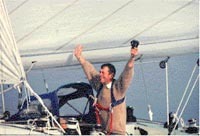
Company/Organization Profiles | Local Industry
The Real Reality
Written by Nicole Sawyer | Posted by: Anonymous
Christopher Knight, who graduated from the Harvard Graduate School of Design with a Master of Architecture degree, founded the Cambridge-based production and distribution company in 1969. He had been taking photographs since he was a teenager and became interested in film as a way to join this passion with his design skills. His first production was the critically-acclaimed documentary "Carry It On," which follows Joan Baez on tour and explores her involvement in the anti-war movement. "When we incorporated to make ‘Carry It On,’" Knight recalls, "we wanted to call ourselves The Film Company, but the Mass. Secretary of the Commonwealth wouldn’t let us because there was another company called Films Inc. So we called ourselves The New Film Company. Not so true after 32 years." Yet the inventiveness of their films suggests that the company name fits quite well.
The New Film Company entered into the world of adventure with a documentary television special for PBS, "American Challenge: Alone Against the Atlantic" in 1982. This film documents the Observer Singlehanded TransAtlantic Race from Plymouth, England to Newport, Rhode Island. The contest attracts participants from all over the world and at that time had never been won by an American. With roughly 60 sailors competing, each on his own boat, it was a difficult subject to film, but one that Knight felt very passionately about. "I had made films, and done a lot of sailing… but never made a film about sailing," says Knight. "Phil Weld, [the American] who eventually won the race, came to me with the idea, which I jumped at immediately, despite the technical difficulties of filming singlehanders. Sailing is my favorite activity, so what a way to combine business and pleasure."
Knight met the technical challenge by narrowing his focus to seven American participants and devising a system of automatic cameras on each of their boats. The cameras were programmed to turn on at timed intervals and capture thirty seconds of footage. Knight also provided the sailors with brief training and allowed them to press a button and start filming whenever they liked. Joyce Zinno, who joined the company in 1974 and acts as production manager and distribution manager, comments that this practice resulted in "a very dramatic film, a very ‘Survivor,’ ‘you are there’ sort of experience." Yet "American Challenge" offers more emotional intensity and substance in its adventure story than the "Survivor" television series, without the contrivance. And Knight did it nearly two decades before the series caught on to the trend. The film’s original approach paid off, earning a CINE Eagle Award, as well as an Award for Cablecasting Excellence (ACE) and American Film Festival Red Ribbon.
In addition to their adventure documentaries, New Film also produces a number of films dealing with the environment and conservation, such as the 1985 PBS special "Home Free: Return of the Bald Eagle." It is the story of wildlife photographer Jack Swedberg and his plan to return the national bird to Massachusetts. The film follows Swedberg through the capture and nurturing of the eaglets to their release in their new home on the Quabbin Reservoir. By using close-up photography and presenting the material as Swedberg’s personal story, Knight created a film that the Library Journal called "a picture of the bird so intimate the viewer is likely to forget that the creatures don’t understand their captors’ words and intentions." The film became a big fundraiser for PBS and received a number of honors, including a CINE Eagle Award, an Honorable Mention and Merit Award at the International Wildlife Film Festival, and Eddy for Best-edited Documentary, and qualification as a finalist at both the American Film Festival and the North American Association for Environmental Education contest.
Although New Film produces films on a number of social and educational issues for a variety of mediums, including slide shows and interactive videodisks, they "mainly like to stick with the environmental and adventure films. The company consists of only two permanent members, Knight and Zinno, and they hire freelancers as needed to keep costs down. The quality of the films does not suffer from the economy, however. In fact, it provides the viewer with a more immediate experience and exposes him to subjects he is not likely to learn about elsewhere.
For instance, New Film produced an episode for the PBS series "Nova" ("a quirky one for ‘Nova,’" says Zinno) which follows Richard Wheeler as he kayaks from Newfoundland to Cape Cod, paralleling the extinction of the Great Auk 150 years ago with the current decline of the fisheries. Their production of the documentary "Around Alone" profiles Dodge Morgan’s solitary 150-day journey around the globe, shattering the previous record and becoming the first American to sail solo, non-stop around the world. They also produced several segments for the PBS series "Boatworks," hosted by Robert Urich. The series began broadcast in April 1997.
Despite the attention and acclaim their films have received, The New Film Company still has difficulty distributing its films in the mainstream market. "We have pretty much given up on the stores like Blockbuster and Hollywood Video," Zinno says. "They aren’t interested in our kind of documentary and are just not willing to stock our films. We can’t quite match what the big distributors can do."
Although they are up against big budgets and the latest technology in the mainstream market, the information age has afforded one advantage to small companies like New Film. The Internet has made it much easier to distribute videos and reach a wider and more diverse audience. They have their own Web site on which they sell their titles; other sites "can be convinced to offer our videos," says Zinno. "It’s easy for them because they don’t have to stock the videos. We can direct-ship the orders."
This allows The New Film Company more freedom to continue producing their socially responsible, emotionally-driven films and exploring new territory. Their latest project, a curriculum piece designed to accompany various books for students, covers a variety of topics such as bio-diversity and astrophysics. "School subjects aren’t the same as they used to be," Zinno jokes. That makes The New Film Company, with its unique perspective and fresh approach to filmmaking, just the right organization to be involved in the new directions in education and make learning a real-life adventure.
For more information about The New Film Company, visit www.newfilmco.com. Their titles are also available for sale through BuyIndies.com at www.buyindies.com.










